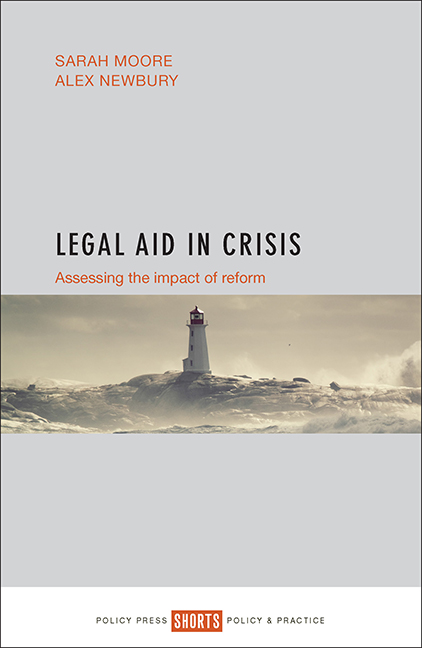Book contents
- Frontmatter
- Dedication
- Contents
- List of abbreviations
- Acknowledgements
- 1 Legal aid in crisis
- 2 Legal aid reform in historical and international perspective
- 3 Assessing the consequences of legal aid reform in England and Wales
- 4 Towards a holistic conception of legal aid
- 5 Refocusing the debate about legal aid
- List of statutes
- References
- Index
1 - Legal aid in crisis
Published online by Cambridge University Press: 05 April 2022
- Frontmatter
- Dedication
- Contents
- List of abbreviations
- Acknowledgements
- 1 Legal aid in crisis
- 2 Legal aid reform in historical and international perspective
- 3 Assessing the consequences of legal aid reform in England and Wales
- 4 Towards a holistic conception of legal aid
- 5 Refocusing the debate about legal aid
- List of statutes
- References
- Index
Summary
Introduced in England and Wales as part of the mid-20th-century move towards welfarism, legal aid is currently undergoing the most radical set of reforms in its 65-year history. This is part of a global shift. Many economically developed countries have embarked on sweeping reforms to legal aid, and this book considers the cuts in England and Wales in this context. Given the scale and nature of the shift in legal aid provision, the issue has received surprisingly little media attention. As we write this introductory chapter, most national newspapers are running a story about the publication of a United Nation's report on the effect of United Kingdom (UK) austerity politics on human rights (Committee on Economic, Social and Cultural Rights, 2016). Though the report is excoriating about legal aid reform, identifying it as a particular source of concern, none of the news items even mention it. This is no accidental omission. Legal aid is routinely left out of news coverage of the social costs of austerity. We consider the relative lack of public debate about legal aid reform later. For now, and by way of introduction, we want to sketch out why we think legal aid reform matters and, more than that, why it should be seen as among the most important and impactful changes wrought by austerity politics.
Why does legal aid reform matter?
There are various problems we could latch on by way of introduction. Take the fact that the reforms have removed publicly funded legal support for most people seeking to challenge the state's decision on their social welfare arrangements. These cuts have recently come under scrutiny from the Low Commission (2014; 2015), a group formed to examine the impact of the legal aid reforms on social welfare law. The Commission's reports offer up meaningful suggestions for reform. Even so, they make for depressing reading. The abiding impression is that the cuts to legal aid have had perverse consequences, most notably that people seeking legal advice on most social welfare issues are now without publicly funded support unless they reach a crisis point. The removal of this safety net of support means that more people get to the point of teetering on the edge.
- Type
- Chapter
- Information
- Legal Aid in CrisisAssessing the Impact of Reform, pp. 1 - 14Publisher: Bristol University PressPrint publication year: 2017



